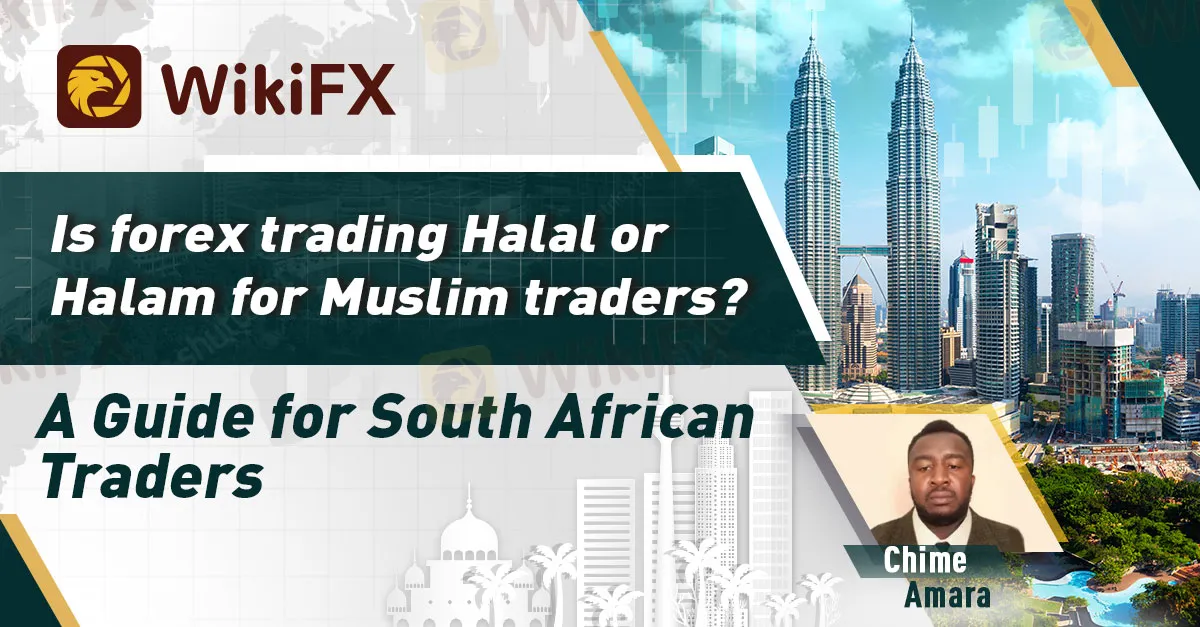简体中文
繁體中文
English
Pусский
日本語
ภาษาไทย
Tiếng Việt
Bahasa Indonesia
Español
हिन्दी
Filippiiniläinen
Français
Deutsch
Português
Türkçe
한국어
العربية
Is forex trading Halal or Halam for Muslim traders? A Guide for South African Traders
Abstract:Forex trading deals with buying and selling of currencies in the global market. The forex market is the largest and most liquid financial market in the world, with an estimated daily trading volume of over $5.1 trillion. In South Africa, forex trading has gained popularity in recent years, with many traders interested in exploring this market. However, for Muslim traders, the question arises as to whether forex trading is Halal or Haram (permissible or prohibited) according to Islamic law. In this article, we will explore this question in-depth and provide a guide for South African Muslim traders.

By: Chime Amara

What are Halal and Haram in Islamic Law?
In Islamic law, Halal refers to actions or practices that are permissible according to Shariah (Islamic law). Haram, on the other hand, refers to actions or practices that are prohibited by Shariah. The concept of Halal and Haram extends to all aspects of life, including finance and business.
Forex Trading and Islamic Law
Forex trading involves buying and selling currencies, which may involve the payment or receipt of interest or Riba. In Islamic law, Riba is prohibited, and any transaction that involves Riba is considered Haram. Riba refers to any increase or excess that is received or given in a loan or debt, whether in cash or kind.
In traditional forex trading, interest is paid or received on trades that are held open overnight, which may be considered Riba. Therefore, forex trading may be considered Haram for Muslim traders who adhere to Shariah law.
Islamic Forex Trading - Swap-free Accounts
To address the issue of Riba, Islamic forex trading accounts were introduced, also known as Swap-free accounts. These accounts are designed to comply with Islamic law by eliminating the payment or receipt of interest. In Islamic forex trading accounts, positions are not held open overnight, instead, they are closed before the end of the trading day. Therefore, no interest is paid or received, and the transaction is considered Halal.
Islamic forex trading accounts may also charge a commission instead of interest to cover the costs of maintaining the account. This commission is fixed and agreed upon in advance and is not based on interest rates.
Guidelines for South African Muslim Traders
South African Muslim traders who wish to engage in forex trading should follow the following guidelines to ensure that their transactions are Halal:
A. Choose an Islamic Forex Trading Account: South African Muslim traders should choose an Islamic forex trading account that complies with Shariah law. These accounts are also known as Swap-free accounts.
B. Avoid Margin Trading: Margin trading involves borrowing money from a broker to trade. This may involve paying interest on the borrowed amount, which is considered Haram. Therefore, South African Muslim traders should avoid margin trading and only trade with their funds.
C. Avoid Leveraged Trading: Leveraged trading involves trading with a larger amount of money than what is available in the trader's account. This may involve paying interest on the borrowed amount, which is considered Haram. Therefore, South African Muslim traders should avoid leveraged trading and only trade with their funds.

Disclaimer:
The views in this article only represent the author's personal views, and do not constitute investment advice on this platform. This platform does not guarantee the accuracy, completeness and timeliness of the information in the article, and will not be liable for any loss caused by the use of or reliance on the information in the article.
Read more

Why Germany’s Economy and Stock Market Tell Two Different Stories
Germany's economic growth has continued to be sluggish, yet its stock market has remained exceptionally strong, sparking widespread attention. Why do we see a coexistence of economic stagnation and stock market prosperity? In this article, we will delve into the reasons behind this phenomenon and possible strategies for addressing it.

Which Zodiac Sign Makes the Best Trader?
It’s often said that when money is at stake, the true nature of human character—both its brilliance and darkness—is revealed. Trading is one such arena where greed, hesitation, courage, and decisiveness come into play. Successful trading requires more than fundamental and technical analysis skills; a deep understanding of one’s personality is equally crucial. Different zodiac signs exhibit unique personality traits—can these traits influence investment returns? Keep reading to find out which zodiac sign makes the best trader!

Taxes – The Silent Battlefield
Nigeria's tax reform, particularly the new tax plans proposed by President Bola Ahmed Tinubu's government, has become a national focal point.

Nigeria and Emerging Economies Face Challenges in the Next 25 Years
Nigeria continues to face significant challenges, including high debt, currency devaluation, and rising prices. On top of that, climate change-induced weather disasters and food security issues have made the economic outlook less optimistic.
WikiFX Broker
Latest News
IG Japan Extends US Stock CFD Trading Hours in 2025
ALERT! Warning against Livaxxen
Which Zodiac Sign Makes the Best Trader?
Plus500 Collaborates with Topstep, Prop firm
Will Gold Prices Continue to Rise Due to Trump’s Tariffs?
Miami Firm Owner Pleads Guilty to $6M Ponzi Scheme Fraud
NBI Cebu Arrests Forex Trader for Illegal Investment Solicitation
PU Prime's "Feather Your Trades" Contest! Begin
eToro Files for IPO with $5 Billion Valuation on NASDAQ
Is FizmoFX a Scam? Fraud and Account Suspension of Traders
Currency Calculator


